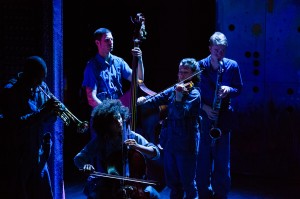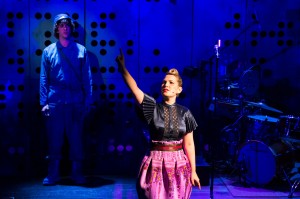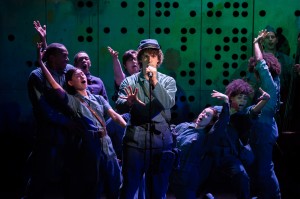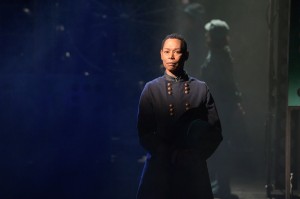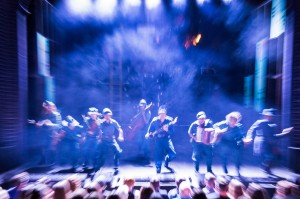A CERTAIN FUTURITY
César Alvarez’s fascinating musical Futurity begins with Mr. Alvarez and Sammy Tunis taking the stage as themselves, greeting the audience, engaging in improvised banter, then performing a song about Sylvester Magee. A real person who claimed to have been born a slave in 1841 and to have fought in the Union army, Magee lived to see the moon landing and died in 1971. But this show isn’t about Sylvester Magee, the co-stars inform us. It’s about Julian (Mr. Alvarez) a fictional Union recruit, and Ada Lovelace (Ms. Tunis), a mathematical genius and daughter of Lord Byron, and about their correspondence regarding the building of a computer that would have the imagination to come up with nonviolent solutions to all the world’s problems.
Although the action takes place in Virginia during the Civil War, the setting is more metaphysical than literal: soldiers are armed with musical instruments and wear mid-20th-century-type fatigues dyed a surreal blue-green (excellent costumes by Emily Orling); the rear wall is made up of what appears to be gigantic computer punch cards’”later to be removed, revealing an elaborate “steam-powered computer” with lots of interconnected rotating parts (inspired set design by Ms. Orling and Matt Saunders with Eric Farber). It’s a place for Mr. Alvarez to explore and connect seemingly disparate themes and ideas: the use of human beings as tools’”slaves, soldiers’”to do jobs that “never should of needed to be done”; imagining how someone from the past imagined the future; asking “what’s the animating force from which intelligence emerges”; the invisible connections between objects, between people; singularity.
Mr. Alvarez’s music, which he composed in collaboration with The Lisps, as well as his deceptively sharp lyrics, have an intentionally “homemade” feel. And this, combined with the relentlessly appealing cast under Sarah Benson’s capable direction, makes the show and it’s big, intellectual ideas feel personal and intimate. (While the entire ensemble of actor-musicians is a pleasure to listen to and watch, Mr. Farber on percussion is especially delightful’”besides drums he plays a washboard, little metal baubles, and a myriad of objects I am at a loss to identify, all designed by Mr. Farber as well.)
Futurity is not without its shortcomings. There is a sense that Julian would like to get the computer up and running quickly, so it can do its job before he is ordered into battle’”I get this cerebrally but I do not feel his desperation. Absent is any sexual tension between Julian and Ada’”if one is going to talk about humanity, nature, interconnectedness, war, and slavery, sex needs to be in there somewhere, in some form. A little sex might also ground things a bit more dramatically and make Julian and Ada a little more real. As is, they’re a touch on the abstract side and not as connected to their realities as perhaps they should be, which slackens tension.
That said, so excellent are most elements of the show, the performers so thoroughly charming, that they overshadow the show’s few flaws and make the experience of Futurity a pleasure.
Featuring: Fred Epstein, Eric Farber, Eamon Goodman, Karen Evans Kandel, Kristine Haruna Lee, Mia Pixley, Jessie Shelton, Kamala Sankaram, Darius Smith, and Storm Thomas.
photos by Ben Arons
Futurity
Soho Rep and Ars Nova
in association with Carole Shorenstein Hays
Connelly Theater, 220 E. 4th St.
ends on November 15, 2015
for tickets, call 212.352.3101 or visit Soho Rep


